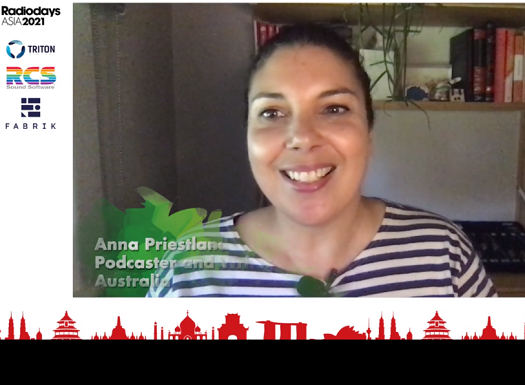In a session called Creative Podcasting: Fact and Fiction, Nikesh Murali (Podcaster, Indian Noir, India), Anna Priestland (Podcaster and Writer, Australia), Jon Manel (Podcast Commissioning Editor, BBC World Service, UK) spoke about how you can “catch the ear” of your listener. What are good ways to write and produce podcasts to make them a real hit and the right creative treatment for factual and fiction podcasts as well as news reporting to keep your listeners subscribed and downloading.
Speaking from her perspective as a narrative non-fiction podcast writer and producer, Anna said she has written for a number of hosts and narrators. Non-fiction is all about story-telling, whether off-the-cuff or scripted.
“The voice plays an important role in catching the ear of a listener. You can have the best story in the world but if the person who is telling it isn’t captivating, you’re probably never going to love the show. Sometimes this is about the audience believing in and trusting the person telling the story, but it all boils down to how invested they are in what they are telling you. It’s less about pitch and tone and more about personality and investment.”
“Whether you’re writing bullet points or scripts, think about the confidence the host or yourself have in what they are saying. They have to connect with the work and believe in it. It’s also this confidence that can be one of the first things a listener hears in a voice.”
Her top three tips for writing podcasts are:
- Outlining – With a clear outline, even if it’s just bullet points, your podcast will be so much clearer and that clarity is what your listener is also looking for. By providing it, you’re helping your listener make sense of what is happening in your story. It will also keep you from going off-track or digressing or repeating yourself, and you won’t bore the listener by rambling.
- Research and fact-checking – If you want your audience to believe you, you need to feel like you’re the most knowledgeable person on what you’re saying and being able to verify that stuff. Include your audience in the story while researching it, it will strengthen your relation with your listener and they will be more invested in you.
- Foreshadowing – It is basically dropping a hint about what’s to come in a story. This can be a small detail or event which will later reveal itself to be important. Sometimes it may feel like tricking the listener, which is also as fine line. Also think about the flow of your story which also goes back to outlining.
Subscribe to the radioinfo podcast on these platforms: Acast, Apple iTunes Podcasts, Podtail, Spotify, Google Podcasts, TuneIn, or wherever you get your podcasts.


